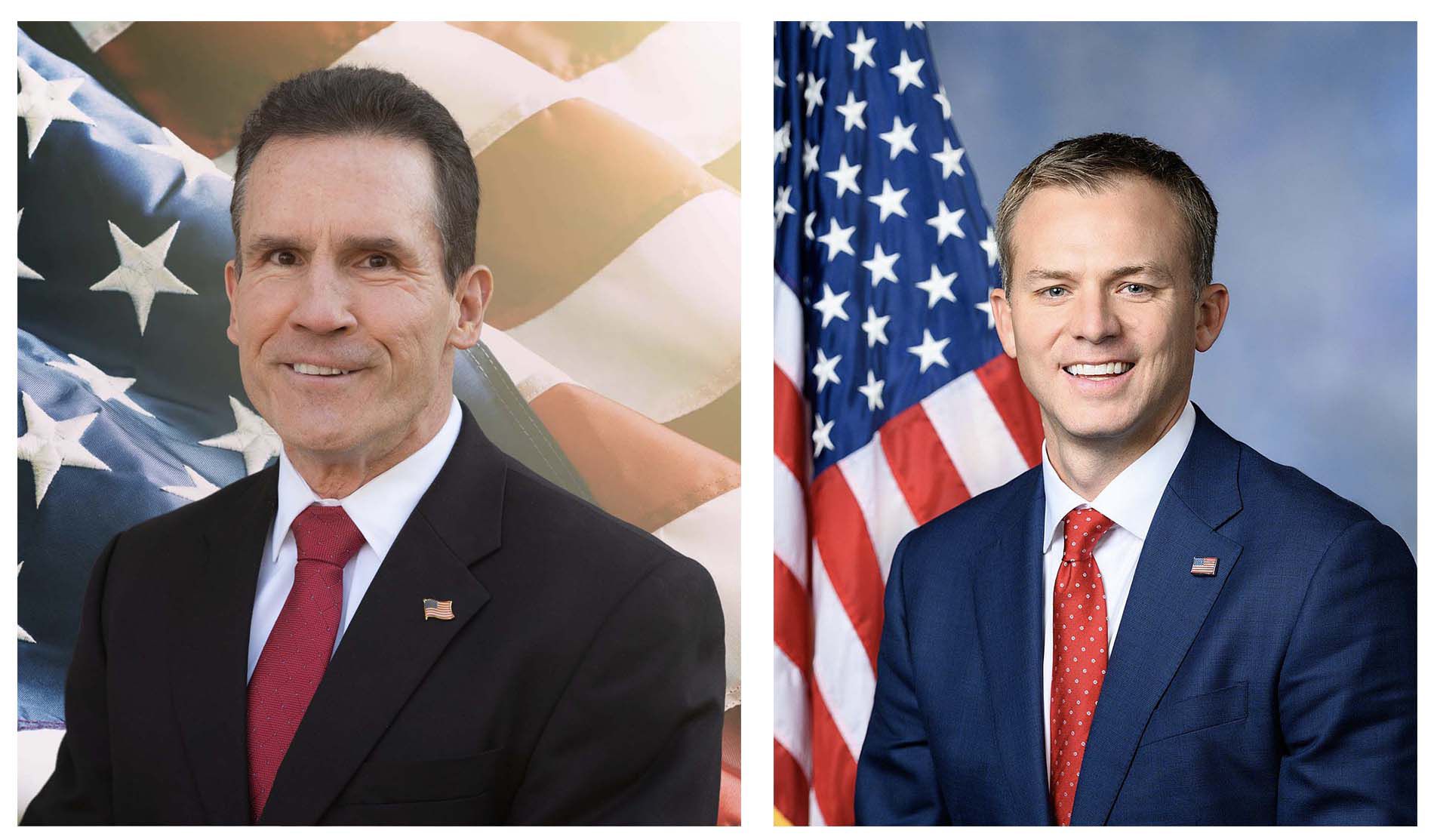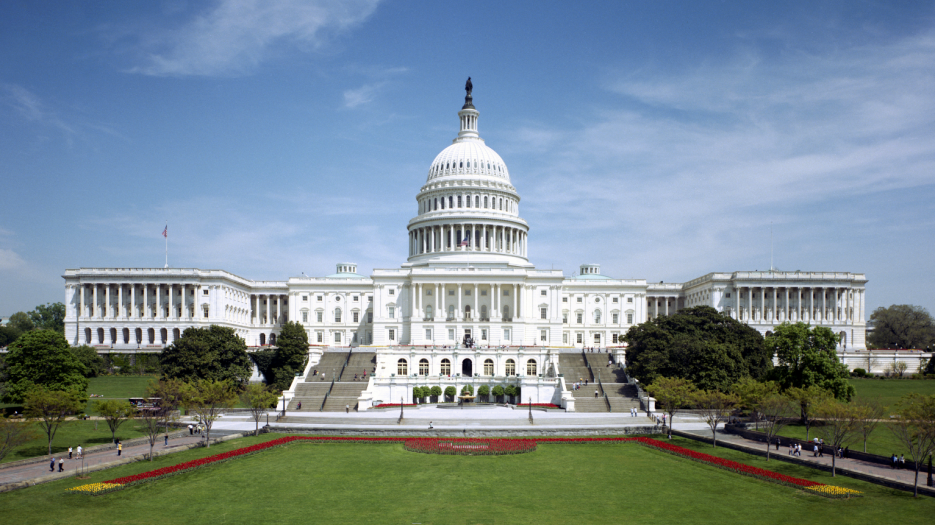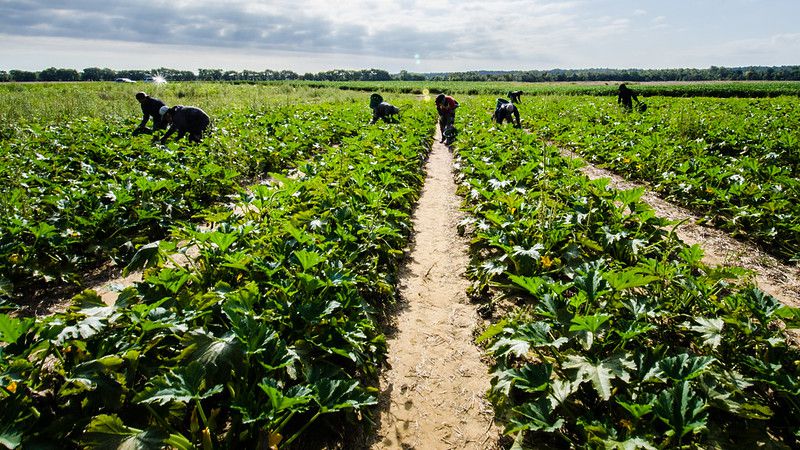2024 U.S. House Political Questionnaire - District 1
Published
10/7/2024
The Utah Farm Bureau reached out to candidates for the 2024 General Election for U.S. House District 1. Utah Farm Bureau does not endorse candidates, and simply provides these answers to questions to help voters when making election decisions.

William Campbell (Democrat), left, and Rep. Blake Moore (Republican), right.
TAX POLICY
Agriculture operates in a world of uncertainty. From unpredictable national situations to commodity and product market instabilities to fluctuating input prices, from natural disasters and damaging weather events to insect or disease outbreaks, running a farm or ranch business is challenging under the best of circumstances. Farmers and ranchers need a tax code that provides certainty and recognizes their unique financial challenges.
In Congress, what provisions would you support to help farmers and ranchers remain on the land and producing food, fuel and fiber?
Campbell: Farmers and ranchers definitely serve several critical roles. I agree operating conditions are challenging and help is needed. I decline, however, to make political campaign promises that I likely cannot fulfill.
Moore: I’m proud to serve on the House Ways and Means Committee and lead out on the tax teams that are collecting feedback from stakeholders across the country as we get closer to the expiration dates of many Tax Cuts and Jobs Act (TCJA) provisions. I’ve had many meetings and roundtables with Utahns to ensure we’re meeting people’s needs as we seek to extend and improve the TCJA next year. Eliminating estate taxes is critical for family farmers and ranchers, and we need to ensure that this is a piece of the TCJA extensions when we tackle tax reform in 2025. We need to maintain many of the TCJA tax provisions that help agriculture –from reduced tax rates to business income deductions to expensing and maintaining the increased alternative minimum tax threshold, we should make permanent these important provisions to give farmers and ranchers more certainty.
REGULATORY REFORM

All Americans have an interest in a regulatory process that is transparent and fact-based, respects the will of Congress, and observes the separation of powers in the Constitution. Federal regulations have a direct impact on farmers and ranchers, and over the years, the breadth and extent of that regulatory landscape have changed.
What actions would you take to ensure that the federal government’s regulatory burden on businesses such as farming and ranching is consistent with congressional intent? Would you support regulatory reform to ensure that federal regulations meet a cost/benefit test and make the process of writing new regulations more transparent, and if so, how?
Moore: The Biden Administration’s addiction to red tape and regulations is hurting Utah’s farmers and ranchers. When it comes to regulation, we need more congressional oversight, transparency, evidence-based processes, coordination with the agriculture community, and litigation reform. There are simply too many policies impacting our farmers that are determined by unelected bureaucrats and the court system instead of congressional representatives. The rules that govern our farms, environment, and lands should be bottom-up, not top-down. I voted for the REINS Act to prevent executive overreach and ensure that every major rule proposed by the administration must be approved by Congress.
Campbell: Yes, I fully support improving the regulatory process. Ensuring each requirement meets the cost benefit test would be a primary criteria. I am a businessman that fully respects proper and necessary controls while understanding the cost and efficiency reasons unnecessary controls should be discontinued.
ENDANGERED SPECIES ACT
Privately owned land provides habitat for the majority of our nation’s endangered and threatened species. As a result, landowners often face harsh regulatory restrictions on their ability to use the land or, worse, lawsuits or enforcement actions. Meanwhile, few species have actually been recovered under the law.
Is it time to think about incentive-based programs that create a positive role for landowners in species recovery? What recommendations do you have for reforming the Endangered Species Act, and what role would you assign America’s landowners?
Campbell: Yes, we should reform the Endangered Species Act. A primary focus should be the long-term cost/benefit impact in our society. Regarding landowners, I would take the position that there should be an extremely high threshold before new or further regulations are even considered.
Moore: Absolutely – incentives are a far more effective tool than land use restrictions. Utah’s farmers and ranchers are leaders in the country’s conservation efforts, and we should give them the appreciation and respect they deserve by providing them with more agency and voice in efforts to restore habitats. The Endangered Species Act must be reformed so that farmers and ranchers aren’t victim to unnecessary lawsuits and rules that hurt our region’s ability to farm productively and keep family businesses operating. The ESA’s ever-expanding reach into farmers’ daily lives is hurting our ability to grow great, local food and is sometimes in direct conflict with constitutional property rights.
AGRICULTURAL LABOR
Farmers and ranchers need a reliable, skilled workforce. Farm work is challenging, often seasonal and transitory, and with fewer and fewer Americans growing up on the farm, it is becoming increasingly difficult to find American workers attracted to these kinds of jobs. Farm labor can’t all be replaced by machines, either.
What role can Congress play in addressing the critical labor shortages that many farmers and ranchers face each year? How optimistic are you on finding workable (and passable) solutions to the labor crisis?
Moore: I have said many times that we need a merit-based immigration system that serves the needs of the American economy. We also know that our farms depend on foreign labor and we need to give farmers legal pathways to bring in necessary laborers for the good of our food supply. Members of the House Agriculture Committee recently released recommendations around improving the H-2A program and reforming wage calculation standards, and this is a step in the right direction. I will always be part of the solution on immigration reform, and I have worked with my colleagues across the aisle on legislation that would secure the border while providing common-sense labor and visa reforms. With the current makeup of the White House and Congress and the filibuster in the Senate, there is no way to enact immigration reform without both Republican and Democrat votes, and that's why I'm a member of organizations like the bipartisan Problem Solvers Caucus. We need more people focused on pragmatic wins that will help move the needle. Otherwise, unfortunately, nothing will ever change.
Campbell: We should continue the current visa programs to provide partial solutions to labor needs. I am a strong advocate for automation. Automation will never be a full solution but can alleviate labor needs and improve efficiency.
PUBLIC LANDS
The federal government often changes policies regarding the management of public lands that impact agriculture and the multiple-use principle of public lands. More than 2/3 of Utah is public land in one form or another.
What will you do in your office to ensure that public lands can be used for the multiple uses they are designed for, including agriculture?
Campbell: I will support legislation that expands private use of public lands. Usage fees would be kept minimal.
Moore: In Utah, we know that the people closest to the land know how to manage it better than anyone in Washington, D.C. In Congress, I am fighting against the Biden Administration's overreach into Utah's backyard. I have authored bills to increase recreational opportunities and have supported legislation that blocks Biden Administration rules that could prevent new grazing, energy production, and recreation on large swaths of public land without any input from the local communities or the State. I am committed to making sure that the people who live in the heart of public land are leading the land management decisions that affect us from grazing management to water access to wild horse/burro issues. I believe farmers and ranchers should have the opportunity to use, recreate, and enjoy the lands that make Utah beautiful.
TRADE
.jpg)
After decades of ag exports being a mainstay in our national balance of trade, the United States has been a net importer in agricultural trade since 2021.
- Does this raise national security issues?
- What can be done in your role to help this?
Moore: A) I am absolutely concerned about this shift. Food security is national security, and we must maintain the U.S. agricultural systems that are critical to the safety and quality of our food. The Biden Administration has done nothing to advance U.S. trade and has made few attempts to negotiate trade deals with our partners. While our exports and imports have generally increased over time, exports are now falling and this widening deficit instructs us to analyze market access issues and tariffs. Jumpstarting our trade agenda is necessary for our farmers, ranchers, and others who work in the food supply chain. Especially in the wake of the supply chain and economic challenges during the COVID pandemic, we know that we need more resilience in our systems.
B) We need the right regulatory, tax, manufacturing, and trade policies to allow our farmers to compete fairly and to keep more of our food supply chain operating here in the United States. Again, I’m happy to serve on the Ways and Means Committee, which has jurisdiction over U.S. trade policy, and I am an enthusiastic voice in pushing U.S. Trade Representative Tai to craft an active trade agenda. I am hugely supportive of trade agreements and the provisions in the House Farm Bill that expand markets for U.S. agricultural exports including pork, dairy, beef, and other top Utah products.
Campbell: Yes food, fuel, fiber are all critical for national security. [I support] trade and economic policies that promote farmland and increasing output capability to return to a net exporter status.
GENERAL
Outside of agriculture, what are some of your main issues that you hope to address if elected?
Campbell: My Priority U platform focus on You, USA, Utah and Unity.
Moore: I am fighting Biden's failed agenda by working to lower inflation, secure the border, strengthen our military, increase energy production, defend the Second Amendment, increase land access, and confront the tech companies that are harming Utah’s youth. In 2025, many provisions of the Tax Cuts and Jobs Act will expire, and I will be leading the negotiations for tax reform for Utah families, farmers, and small businesses as the only Utah Republican to ever serve on the tax-writing Ways and Means Committee. We simply must increase economic growth and cut mandates and government programs for the sake of the next generation. The inflation and debt crises are harming Utah households and making it extremely difficult for folks to get ahead. Americans are now spending $1,000 more per month on household costs than they were three years ago. It’s imperative that we fight inflation and take comprehensive steps to make life more affordable for Utah families. Fighting for the servicemen and women at Hill Air Force Base is another priority as we modernize and improve our defense initiatives to compete with China, Russia, and Iran. Please see my campaign website for more information.
Please see my campaign website for more information.

